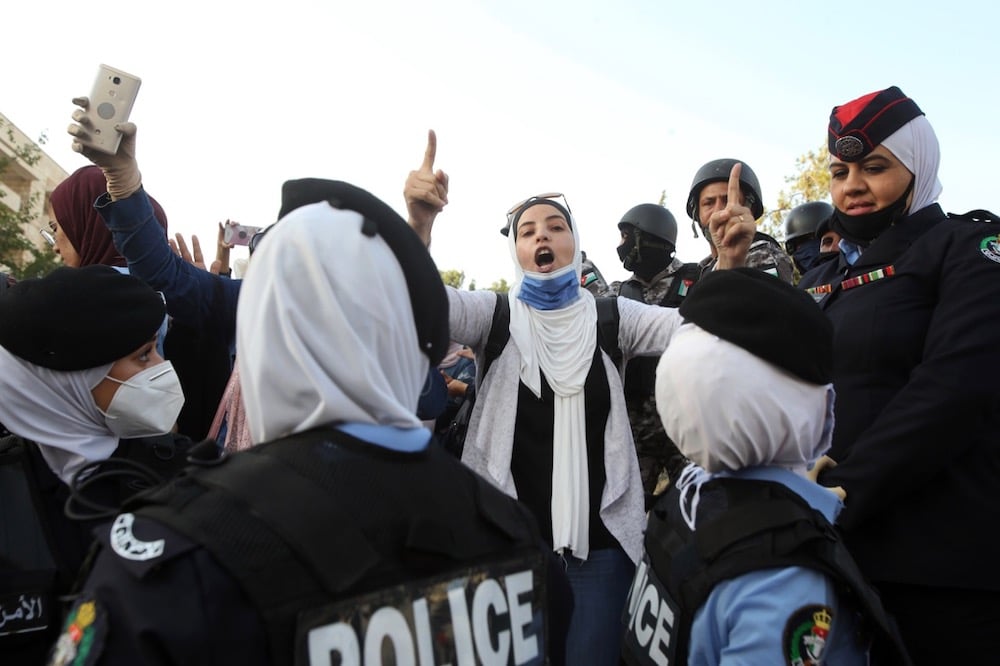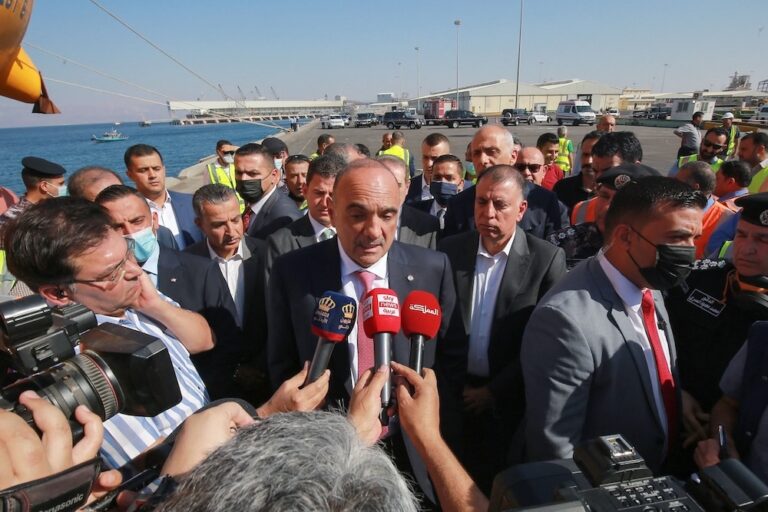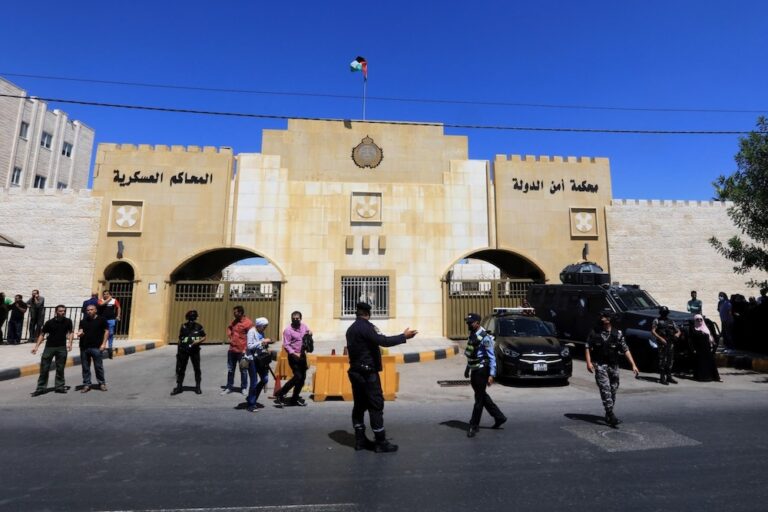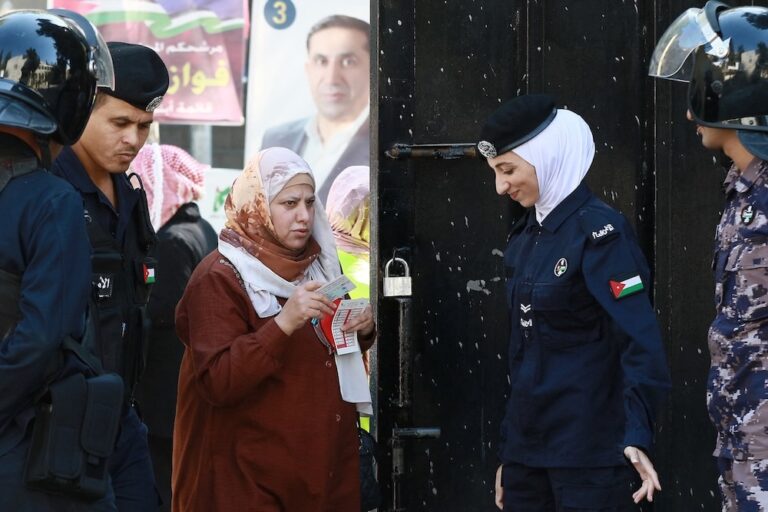Since the start of the COVID-19 pandemic, Jordanian authorities have been cracking down even more so on journalists by passing new legislation further limiting freedom of expression.
This statement was originally published on gc4hr.org on 29 June 2022.
Freedom of the press and expression has been limited by the Jordanian government throughout the years with journalists and media organisations facing constant surveillance, similar to neighbouring countries. However, according to research by the Gulf Centre for Human Rights (GCHR), since the start of the COVID-19 pandemic, the Jordanian government has been cracking down even more so on journalists by passing new legislation further limiting freedom of expression inside the Kingdom.
Jordan’s press laws lie within Article 15 (1) & (3) of the Jordanian Constitution which provides respectively that “the State shall guarantee freedom of opinion, and every Jordanian shall freely express his [or her] opinion by speech, writing, photography, and the other means of expression, provided that he does not go beyond the limits of the law;” and “the State shall guarantee the freedom of the press, printing, publication and information media within the limits of the law.” However, this ‘freedom’ of expression and press has always been regulated by state authorities that have used the anti-terrorism law, cybercrimes law, press and publications law, and penal code to arrest journalists and harass local media publications.
Under Jordanian law, it is a crime to criticise the king, government officials and institutions and defamatory speech is prohibited. However, in July 2020, Jordanian authorities implemented stricter media surveillance by placing press gag orders that prohibited reporting on local protests in response to the closure of the Jordanian Teachers’ Syndicate (JTS). The attorney general issued a press gag order prohibiting discussion of the subject by local journalists and media outlets. This led to even more arbitrary press gag orders in 2021 that were meant to target the ongoing reporting about the JTS and the April 2021 arrests of Prince Hamza and other officials accused of allegedly plotting to undermine the country’s leadership. Furthermore, in October 2021, Jordanian press outlets were prohibited from reporting on the release of the Pandora Papers, which revealed the king’s corruption scandal in regards to owning real estate holdings in the United States and the United Kingdom.
Despite the limits placed on free expression and the press in recent years, on 25 April 2022, the Parliament made an amendment to Article 225 of the Jordanian Penal Code which further increases the punishment for journalists that publish news on criminal investigations and/or secret trials before their official announcement. Prior to this amendment, Article 225 provided fines for those violating gag orders, but now a jail time of three months has been added to such violations.
These new stipulations are similar to Jordan’s controversial Cybercrime Prevention Law (Article 11), which criminalises libel and slander with a prison sentence of three months. This law has targeted hundreds of political activists, journalists, and citizens for expressing their political views on their personal social media accounts. Similarly, the new amendment to Article 225 makes it illegal to prohibit gag orders on news covering the JTS and the ongoing developments of Prince Hamza’s situation with the royal family. Already the ripple effects can be felt on the ground as few Jordanians seem to be aware that the king recently denounced Prince Hamza from the royal family, which was covered by the Washington Post.
Since being forcibly placed under house arrest last year, Prince Hamza relinquished his royal title earlier this year and posted on social media that he could not reconcile with the ” current approaches, policies and methods of our institutions.” This led the king to publicly denounce Prince Hamza as ‘erratic’ and stated that he would, “never allow our country to be held hostage to the whims of someone who has done nothing to serve his country.” Prince Hamza continues to be detained in his palace where his actions and communications are limited, demonstrating that no one is excluded from abiding by the restrictive policies set in place, including within the Hashemite Royal Family. Such policies are meant to silence those with differing opinions and viewpoints no matter what social status they hold.
The new amendment is no exception as it is meant to muzzle the voices of local Jordanians and intimidate journalists into thinking twice before reporting on certain issues. This can be seen with the case of Basel Al-Okoor, the editor of Jo24 website, who was detained in the summer of 2020 after covering the Teacher Syndicate’s protest, but was later released and found innocent. However, with the new legislation in place, he would have faced jail time for such reporting.
Along with Okor’s case, GCHR also documented in May 2020 the arrest by authorities of Roya TV3’s general manager, Fares Al-Sayegh, and news director Mohammed Al-Khalidi following a news report on workers’ concerns regarding the economic impact of the COVID-19 curfew. Al-Sayegh and Al-Khalidi were charged under the anti-terrorism law, but both were released on bail three days later on 12 April 2020. Under the new amendments, Al-Sayegh and Al-Khalidi would face jail time for reporting on these issues.
Earlier this year in February and March 2022, 12 activists were arrested under the Law of Crime Prevention and the Cybercrime Prevention Law for allegedly “spreading false news”. Some of those detained were forcefully arrested by authorities for simply planning protests or participating in local protests following the elections. Such arrests only continue to infringe upon the basic freedoms of Jordanians and allow the government to continue its absolute rule without having to face questions or criticisms from the public.
Although GCHR has received reports of a backlash against the government from journalists suggesting, based on their experience in the past, that the new amendment only further suffocates free speech, authorities in Jordan still are not ready to protect public freedoms and instead are putting all their efforts to further constrain freedom of expression in a repressive trend that is well documented by human rights organisations in recent years.
GCHR calls on authorities in Jordan, including the government, to:
- Urgently issue legislation that protects public freedoms and, in particular, freedom of expression and freedom of the press in accordance with the provisions of the Constitution, and in line with international legal standards and covenants;
- Amend all legislation that places restrictions on public freedoms and repeal Article 225 of the Penal Code, which limits freedom of expression;
- Put an end to targeting human rights defenders including journalists and Internet activists or whomever engages in peaceful human rights actions, writing, or speeches;
- Fully reinstate the members of the Jordanian Teachers Syndicate and all its branches, including its administrative bodies, the Syndicate Council, the Central Authority; and
- Ensure that all human rights defenders, including journalists, bloggers and Internet activists in Jordan, are able to carry out their legitimate work without fear of reprisals and in a manner free from all restrictions, including judicial harassment and the persecution of their families.



